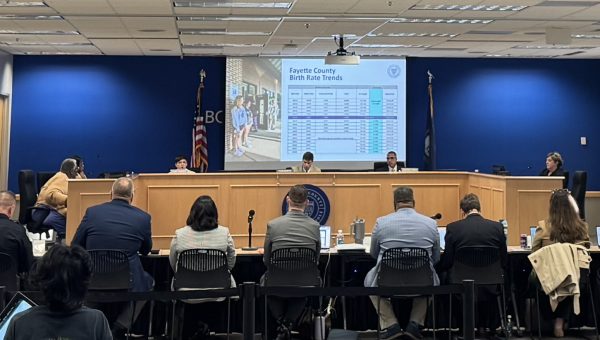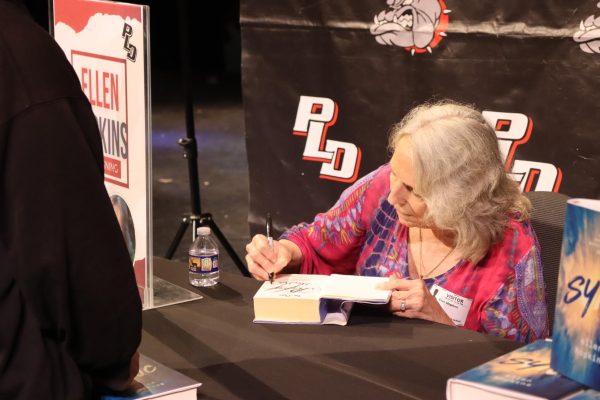Editors’ Reactions to Manny Scott Assembly
Madi Bledsoe, Editor-in-Chief
Manny Scott visited Dunbar and hosted an assembly called “Turn the Page” on Tuesday. During this assembly he changed many lives and inspired many people to be the best that they could be; I was one of them.
Scott is an original Freedom Writer. By 16, his story was almost over. Scott dropped out of school at 14, his father was imprisoned, he lived in 26 places by the time he was 16, and his best friend was brutally murdered. However, Scott managed to “turn the page” and write new, more fulfilling chapters in his life. He is now happily married with three children. Scott is a successful entrepreneur, a PhD. student, and one of the nation’s most inspiring speakers. He is on the road 200 days a year speaking at assemblies in school districts all over the country and conducting workshops for both teachers and students. He inspires students to take responsibility for their own success, he prepares teachers to engage, influence and teach youth, and he encourages parents to become more involved in the educational journey of their children.
For a while now I haven’t been living up to my full potential—I have been going through some things that have brought me down and I have been feeling lonely. I have had no one to talk to because everyone who used to be there for me is turning their backs—I feel lost. I have been struggling every day to wake up, get out of bed and put a smile on my face. When people ask me what is wrong I simply reply “nothing, I’m fine,” as if saying it would make me actually feel it.
Scott changed my life. His words and stories are things that I will never forget. Even though I hardly knew him, I felt like he was there for me. He could sympathize with me and tell me that everything would be okay, actually meaning it. After the assembly, I was lucky enough to interview him along with my fellow editors. The things he had to say were so powerful. He believes that sharing his stories with students and adults is his ministry; it’s his calling. Students who need hope are what keep him going—we are his inspiration and he is ours.
What stood out to me the most was when Scott pointed out that none of us are alone- there are people experiencing the same things that you are every day. He followed this powerful statement with a game. During this game, Scott encouraged students to stand if they felt like they related to any of the statements being said. He then urged everyone to look around at their peers standing with them. This really opened my eyes and enforced the oh-so-cliché saying “you can’t judge a book by its cover.” You never really know what people are going through until you see it from their perspective.
After the game, Scott allowed us to leave our seats to hug and thank the people who have been there with us through it all. The first person I hugged was my little sister; she has truly been there for me. As soon as she embraced me I broke down, I couldn’t hold the tears in any longer. Instead of comforting me with words of reassurance, she hugged me even harder and began to cry, too. There we were, in front of the whole school, sobbing with each other. The great thing was, though, that neither of us cared. I was always afraid of what others thought of me, but Scott showed me that it’s okay to be different–it’s okay to cry.
“Don’t slap a happy face on your problems. It’s normal to feel emptiness and void,” said Scott.
Scott also said something during the interview that I will never forget. He said that no matter who we are or where we come from, we all are struggling. This acted as a personal reassurance that my problems are big enough to be talked about and that they don’t lack any significance whatsoever. This is when I realized that I needed to open up; I needed to let people know that there were emotional problems behind this smile.
After hearing Scott’s speech, I have decided to have a more positive outlook on life. It could always be worse and that’s a concept that I didn’t understand prior to the assembly. Becoming a more open person and sharing my problems has also become a goal of mine. I can’t continue to “slap a happy face on my problems” and pretend that everything is okay because “we all are struggling.” I can’t thank Manny Scott enough for being such a huge influence on who I am and how I go about living my life. He was an inspiration to us all and I do believe his words are ones that we will never forget.
Alyssa Molden, Co Editor-in-Chief
By the time I filed into the gym Monday, my teachers had told me eight or nine times that Mr. Scott’s speech would impact me immensely. Honestly, my reaction to their enthusiasm was less than ecstatic. Yeah right, one speaker is going to drastically change me, I thought. I had no idea what to expect as I walked into that assembly. I just knew that I didn’t want to be disappointed.
At the beginning of his speech, Mr. Scott eliminated the mood of uncertainty that was running rampant throughout the gym by letting us play a game. He named off TV shows, dance moves and musical artists, and whoever liked them was asked to stand up.
I’m sorry to say that I wasn’t able to stand up when he asked who could do the Dougie… but I was able to own up to my unhealthy obsession with SpongeBob. The game was fun and allowed us to feel more comfortable around one another, but we soon realized that it had a deeper meaning. The questions changed from fun to trivial, and eventually from trivial to invasive.
Mr. Scott asked personal questions about our home life and our families. He asked the question, “How many of you have ever seen your mother be hit by a man?”
I was shocked at the number of kids (and teachers) who stood; I was taken aback at the number of students who remained standing when Mr. Scott asked how many of them have ever been hurt because they tried to protect their mom.
Those were just a couple of the many sensitive questions that Mr. Scott asked students. I thought that each question was his last because they were so deep. Somehow each one became more heart-breaking when I saw the number of students who remained standing because they had experienced similar traumatizing situations.
Everyone in the gym was engrossed in the activity in some way. I didn’t stand for any of the serious statements because I have been lucky enough to never experience those things, but that doesn’t mean I wasn’t changed by the activity.
I saw my peers – my friends – stand up for things that I had no idea they were going through. The activity made me realize that everyone hasn’t been as lucky as me. I love the way that Mr. Scott put it.
He said, “To him who receives much, much is required.”
I have been blessed with so much, and I haven’t been giving nearly enough. Mr. Scott made me realize that I can do so much more for people in my life. I don’t even have to give material things, although that will be a good start. I can help by being be a more positive person or making someone laugh.
The activity was a moving part of the speech, but my absolute favorite part was when Mr. Scott allowed us to leave our seats and hug the people who have made a difference in our lives. I was able to hug two of my closest friends and an influential teacher who I’ve had since I was a freshman.
When I hugged my friends, it hit me. We have been through so much together, and our experiences have changed us a lot over the past four years. My friends remind me who I am when I forget and they pick me up when I’m down. Mr. Scott’s speech made me want to be that friend to every single person in the gym because you never know who direly needs a friend like the ones I have been blessed with.
Mr. Scott’s speech reiterated that everyone is vulnerable, even if they don’t show it on the outside. His speech miraculously lived up to every expectation I had. I think some things will change at
Dunbar because he came. It is unrealistic to expect everyone to just automatically love each other, but I will definitely be second-guessing how I treat people from now on.
Manny Scott chose to end his talk with lyrics from the song “I Have a Dream” by Common, which was written for the movie Freedom Writers. The lyrics were the perfect way to end the sensitive morning.
“In search of brighter days, I ride through the maze of the madness… I put together pieces of a dream, I still have one.”
Josiah Howlett, Chief Copy Editor
After hearing that a whole school day was going to be devoted to a speech given by Manny Scott, I was a little turned off by the idea. Why should we give up an instructional day just to hear another person talk? It sounded like I waste of time. However, my pessimistic point of view soon changed after hearing the opening of Scott’s speech.
“If I can help somebody as I pass along, if I can cheer somebody with a word or song, if I can show somebody how they’re travelling wrong, then my living shall not be in vain.”
Scott opened with these emotionally packed lyrics from the gospel song “If I Can Help Somebody” by Mahalia Jackson. Initially, this was rather awkward and many students couldn’t help laughing at him. But, as he continued the song, the laughter and all other noises in the room were soon silenced. Audience members were entranced by how earnest Scott’s performance was; and, by the end of the song, he had them hanging off of every word he said.
Although this was just the beginning, I thought it was the most moving moment of the speech. He was able to capture the attention of the entire audience just by singing. No opening statement. No request for silence. He simply sang. As a singer, it was really touching to hear someone sing so honestly. He didn’t use auto tune, and he didn’t have a backing track. It was just his voice breaking the silence of the room.
From this point on, I was completely rapt in Scott’s speech. He made me think about my peers in a way that no one else has. During the speech, he had us take part in an activity in which we were supposed to stand if we related to the statement he made. He started with light statements like “stand if you were ever a fan of Spongebob Squarepants.” We were all on our feet, reminiscing about the funniest episodes of Spongebob.
Then the statements became more serious. He said things like “stand if one of your parents is an alcoholic.” The room was silent again. It was shocking to see how many of my peers and teachers stood for statements like this one. Some students even broke down in emotion after this. It just goes to show that you never know everything that’s going on in a person’s personal life. This concept isn’t a new one, but it took someone with a powerful story, like Scott, to convey it to us.
Dunbar needed this speech. We needed something to help us relate to each other and to make us feel more united. After hearing Scott speak, I’m definitely going to try harder to be more understanding of the faculty and of my peers. I realize that the things I say can really affect people, even if they don’t show it. I learned a lot from the speech, and I know that I’m not the only one who took something away from it. Scott touched so many lives in the school, which gives me hope for the future of Dunbar and the people in it.
Pam Stravitz, Junior Editor
Manny Scott was seven years old when he received the scar on his left eyebrow. A few blocks from his apartment, he walked into a house for a party his mother was attending. It smelled like alcohol and he could see partiers getting high in the living room. He lost track of his mom in the crowd calling, “Mom? Mom!” The hostess strolled up to him, a cigarette in hand, and pressed it into his forehead. He heard her drunken laughs as he ran out the front door towards home. He sat crying in his room when he felt a “presence” tell him there was hope and that he would never be alone again. This presence is what Manny Scott says called him to this ministry—to help young people understand just that.
Manny Scott’s visit to Dunbar this past Tuesday gave me a new perspective for my school. While there will still be judgment from the stubborn students who attended, it was a necessary event that softened students’ hearts toward others. Call it sappy, but I believe that for school to be a positive place, students need to care about other students.
Scott began his speech having students stand if a certain situation applied to them. The topics ranged from “Best rapper alive” to “a desire to be a pro-athlete.” Students laughed as they stood up, defending their opinions.
Then, he slowly revealed pieces of his story by asking more serious questions.
“Stand up if you live in a single-parent home… Stand up if one or both of your parents is addicted to drugs… Stand up if you have recently—and you define recently for yourself—attempted to harm yourself or commit suicide.”
The room remained hushed. The number of kids who had single parents outnumbered the ones who had stood for supporting Eminem. I could not count the number of people I was surprised to see stand before Scott asked them to sit down. I was oblivious to the problems that I didn’t have to face.
I’d like to think that it was because that person was secretive or shy, but the difficult part was admitting that I had never thought to ask if anything was wrong. A simple, “How are you doing?” may be enough; that’s all Scott had to do to get students to open up to him.
After his speech, Scott stayed in the gym to console students. The fact that I had to wait an hour and a half to interview Scott frustrated me at first. But then I was okay with it once I began talking to Scott. It was a point of humility for me to understand that the people who went before me needed the reassurance he offered.
“I speak to 300,000 to 400,000 people and I’m on the road for 200 days a year,” Scott said.
Compared to the 30 close friends and family I feel like I influence on a yearly basis, Scott impacts so many people. But impact is more than just a onetime thing or a one day get-out-of-class-free card. It requires sacrifice of quality time—something Scott just can’t do to hundreds of thousands of people. It’s our job to follow up.
“Maybe God uses me to soften hearts and someone else plants a seed,” Scott said.
While listening to Scott anonymously describe student conversations of the morning, he admitted that one stood out. A young boy, Scott guessed about fifteen, stood at his shoulder, tears pooling in his eyes. “Mr. Scott, I know you’re busy, but I have to tell you…” Scott waited expectantly. “I was done trying. But today, you gave me hope.”


























